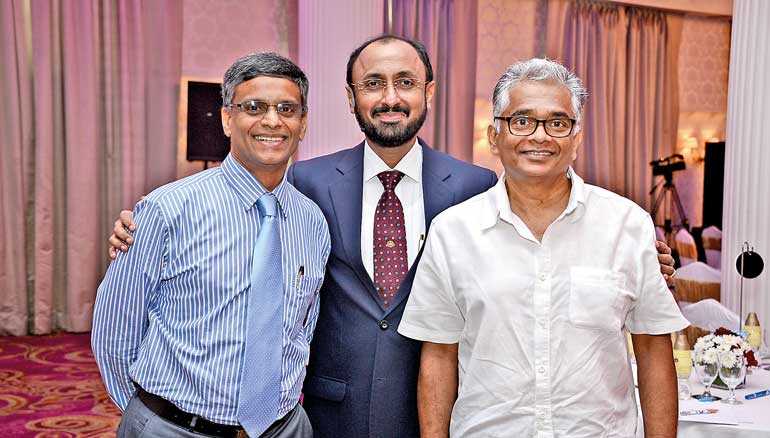Saturday Feb 14, 2026
Saturday Feb 14, 2026
Thursday, 14 February 2019 01:44 - - {{hitsCtrl.values.hits}}


Desire to be cared for is a universal human need. We all yearn for it from the ‘womb’ to the ‘tomb’. Caring is an absolutely essential requirement that all human beings need, and it is something that can be easily given by the sensible use of common sense alone. 
However, with the rapid and continuously diminishing of ‘human values’ over time, as seen now, we find that this aspect of caring concern has become no more common in the present day society especially in various organisations whether they are public or private. In my observation the two main reasons for this are; over dependence on technology and emphasising short term results over long term relationships.
In this situation of winning the ‘heart share’ of the customer being such a pressing and a critical need.
Unless a business is run purely on the lowest cost as a proposition, it is essential that each business offers some kind of a differentiation to be competitive. The tangible aspects can be copied so easily. One of the most difficult to copy, yet easiest to offer, is distinctly different customer experience. This has been the sustainable competitive advantage over several decades in companies such as South West.
When I consider the local scene the positive factor is that an increasingly a large number of entities have realised the importance of educating their staff on customer service. Therefore, organisations currently invest a considerable amount of resources on training and developing people.
However there are a few strategic issues that need to be addressed if the organisations were to reap the maximum benefit from these investments.
Out of them, I will speak about the two most crucial factors.
Service culture
Firstly, we define service culture as ‘Everybody in the entity consistently trying to create a unique experience of value that is highly appreciated by the recipient’. Everybody includes all employees of the organisation, irrespective of their roles, goals and the levels should have a serious involvement in setting up the service culture.
Quite often, I see the training on customer service had become a bottom up approach rather than a top-down initiative. The leadership of the enterprise must accept customer care as a strategic imperative. Then there will be the right emphasis and focus.
The training should never be done for the sake of doing it or to fill a grid by the training manager to say that “I have achieved my annual KPIs”. No training initiative is effective unless the trainer identifies the real requirements of the entity and the needs of the trainee concerned.
Follow-up mechanism
Secondly, my experience also shows that many organisations lack the follow-up mechanism to evaluate the post training impact the learning had made to achieve the desired outcome. As the saying goes ‘what get measured gets done’.
|
The writer conducting a training session |
After a training intervention the managers should agree on at least three action steps that each staff member should implement as a result of participating in the program and incorporate them to the key results area in their annual objectives.
The results from proper training interventions can come when three components come in place. Firstly the trainer providing the required knowledge skills and shaping the attitude, secondly the trainee committing to internalise them and implement them at work and finally the supervisors checking whether this is being done.
Setting up a service culture
Setting up a service culture begins with the organisation’s business philosophy which in other words is called the ‘Vision’. What is the importance we truly give to the customer as a key stakeholder in the business? The company’s policy, is it purely targeted towards profit maximisation or customer satisfaction? Or both?
Many Japanese companies consider profit as only a by-product of their business activity. There are many successful Sri Lankan companies who follow a similar business policy saying, ‘We better take care of the customers first so that in turn customers will take care of the company.’
In my observation these organisations focus on the ‘lifetime value of customers,’ which is much higher than the initial transactional value, and they have successfully managed to establish an outstanding service cultures in their entities. That eventually has led them towards higher profitability earned solely by customer loyalty.
One of the service policies of The Ritz Carlton Hotel chain is reflected in the empowerment given to every employee of their staff, at all levels; they are authorised to spend up to a limit of $ 2,000, to delight the customer. This can be cited as a classic example in this regard. Its service credo, ‘We are ladies and gentlemen serving ladies and gentlemen,’ is embedded into their DNA so that every staff member is alert to use this empowerment judiciously without abuse.
Sri Lankan State organisations
A few Sri Lankan State organisations have successfully fine-tuned their policies to give the importance to the public whom they serve.
The Department of Immigration and Emigration is one of them. Having understood that they were mainly serving the expatriate Sri Lankan labour force, which incidentally brings in the highest foreign exchange earnings to the country and they need the facility of obtaining passports in a hurry, the Department promptly implemented a one-day service to cater to this pressing need.
Sri Lanka is, perhaps, one of the first countries in the region to have initiated such a system. Eventually, even the Department for Registration of Persons too followed suit by offering a similar one day service.
Right processes in place
Once the organisation establishes a policy to set up an appropriate service culture, it has to be followed by putting the right ‘processes’ in place. In order to achieve this objective, if an organisation follows a ‘policy’ that “We will personalise our offer to the customer or we will look at customer convenience first,” the processes has to be fine-tuned accordingly. Obviously, a well-organised system support is needed to be installed to begin with.
Once I was on a flight and when the aircraft was about to taxi its way to the runway, a name of a couple was announced and they were asked to identify themselves to the closest crew member. In a short while, I observed that they were guided from economy class and seats were offered in the business class.
When I clarified the reason for doing so from the leading steward, I was informed that it was their wedding anniversary and the upgrading was done to make them feel special on this journey. I was also told that, once flight took off, the couple would be served with a specially-made cake as well. Although this looks a simple act to the airline, it is going to be a memorable occasion or an experience for these two passengers, thus enhancing their loyalty towards to the airline throughout their life.
To carry out these kind of acts, the organisations should have a policy; in the first place, “Wherever possible we will make the customer special”. This had to be followed also with the right processes in place. Of course in this incident the iPad carried by the Senior Steward was linked to the airline’s CRM that had all the information about the passengers on board in that particular flight. Obviously, the aid of the system support too prompted the crew to act promptly to exceed the expectations of the passengers
The ‘people’ element
Thirdly, the ‘people’ element in setting up a service culture plays a very important role. Here we are referring to people’s mindset, commonly called ‘attitude’. The biggest challenge facing entities today is finding the right people and placing them at the right place so as to consistently offer the service at every point of interaction.
We are in an era where values are deteriorating, staff is lacking the sense of belonging, loyalty towards the workplace is diminishing, not thinking of building up a career in one place, the natural tendency to leave everything to ‘tech’ rather than ‘touch’ and the staff feeling that doing a job is an interlude between breakfast and dinner. Under these conditions, the manner of attuning such people’s mindset to get the needed contribution from them towards setting up the required service culture has become a tall task today.
Soft skills training is considered as a ‘quick fix’ method to provide the required knowledge, skills and the right spirit or the positive attitude to perform. However, it does not necessarily guarantee results unless, as mentioned before, the entity has installed a total strategic approach towards setting up a service culture in the organisation.
With regard to the people element, organisation’s policy towards its staff, in aspects such as, recruitment, orientation, training, recognition, rewarding, retaining, empowering and encouraging etc. play a significant contribution.
As a trainer, I have observed that the staffs who are with dedication with the right passion always contribute to drive the organisation to greater heights in customer service. Even if there is a need for an entity to change their policies and processes, towards customer orientation, it should be initiated by its ‘people’. Despite the fact that we are in the era where, ‘digital experience’ is given a top priority, my belief is that human intervention continues to have a significant role to play in conceptualising and delivering customer friendly solutions, even with the ingress of rapid technological innovations.
Education system
It is my strong belief that any education system must target towards building a ‘strong character’ rather than giving only a mere ‘title based qualification’ to the younger generation. Unfortunately, the parents who are caught in the rat race, during the last few decades, have given priority to their children to excel in formal qualifications with much less emphasis laid on the development of their emotional bonding with one another.
This has resulted today in building up selfishness amongst children from their primary level of education upwards. In the process they are at a loss to understand and realise the fact that later on in life they have to play a vital role for the advancement of the community at large. The essence of this commitment begins with teamwork and selfless sacrifice.
Simon Sinek, the British-American author, motivational speaker and organisational consultant, in one of his presentations on ‘Millennial in the Workplace’ elaborated with a few more comprehensive reasons the manifestation of nasty behaviour in some of present day’s individuals. He says: “Today’s millennials are tough to manage, accused of being entitled, narcissistic, unfocused and lazy.”
It is obvious that all these attributes, either singularly or collectively, drive one towards this despicable introvert behaviour.
Whatever the service one provides using whichever medium, we have to understand that finally it is a human being who is at the receiving end. Therefore, in the act of offering a service, it is of paramount importance to consider that the customer is a person with emotions and feelings, always right and design the solution accordingly. Moreover, keep in mind that the process has got to be designed in a simplified manner which is user friendly to any customer.
Technology is only an enabler
When companies are investing in technology to enhance its efficiency, in service delivery, one has to understand the fact that technology is ‘an’ enabler, and not ‘the’ enabler. Obviously technology is an enabler of growth. Nevertheless, it is only as powerful as the people who are trained to use it effectively. The strongest ‘enabler’ in an organisation’s performance is the service culture which is established by its ‘people’.
Whilst investing in technology, the aspect of educating the staff on how to use it in the most appealing and simplified manner to the customer should also be given due emphasis. The more skilled the staff is in using the technology properly, it is more likely that the entity is bound to achieve greater success.
Many believe that the biggest challenge every entity is facing today is how well ‘Y’ generation or the ‘millennial’ mindset can be attuned towards providing a good service. The key challenge of the top management today is to create an environment to prepare people for the future which is so uncertain and unpredictable.
In such an environment, a national level initiative is needed particularly to a country like ours, where the economy is mostly dependent on the service sector. The entities have to carry out ‘service educational’ programs to its staff with utmost priority.
‘Service training’ vs. ‘service education’
There is a significant difference between ‘service training’ and ‘service education’ programs. In ‘service training’ person is advised as “What to do; act in a particular way in a given situation”. Whereas, in the ‘service educational’ programs the emphasis is on the aspect of conditioning the mind “How to think of what to do; create more value through attuning the mind-set and improving the skill-set”.
Traditional ‘service training’ courses in general dealt with providing some demonstrable skills needed to overcome a situation. What we need today is to go beyond that and think creatively to apply the learning so as to add more value to customers in a given situation. This can be done only through ‘service educational’ programs. If the staff is given the proper ‘service education’ they will be capable of meeting any challenging situation using the basic principles they have mastered in order to create more value to the customers.
In 2005 Singapore initiated at national level a campaign called ‘Go the Extra Mile for Service’ (GEMS) to raise the service standards in the country. This campaign really achieved the desired great success within the stipulated time period.
Have we ever given emphasis at national level, either by public or private sector entities to provide such educational programs to the employees? This question needs to be given due consideration today.
There are noteworthy initiatives taken by some Government institutes. To cite an example, the National Human Resources Development Council of Sri Lanka had taken a great interest in conducting courses to the public sector employees on ‘service education’. Private sector entities do invest substantially on such educational programs, but during periods of economic distress, the tendency is to curtail its training and development expenses. Although affordability can be a matter of concern in hard time, this curtailment deserves to be reviewed thoroughly in terms of priority and vital importance.
It’s a fact that when the economy is bad sales are bound to be low due to the limited buying power arising out of lack of disposable income. This in turn will lower the morale of the staff as they fail to achieve targets and forgo incentives.
Carrying out service educational programs will help to keep staff motivational levels up. Moreover, when the customer is also extra cautious about the monies spent, when they perceive that more value creation takes place through the service provider, the customer is bound to make a favourable purchase decision.
Furthermore, it will enhance customer loyalty to the entity; so that once the economy improves the business can depend to some extent on the customers whom they have already captured to get him in ‘one more time’ to do business. Eventually it will lead to develop a ‘lifetime value’ from the customer.
(The writer is an expert on customer care training with over two decades of experience, having done programs locally and internationally. He can be reached via [email protected].)